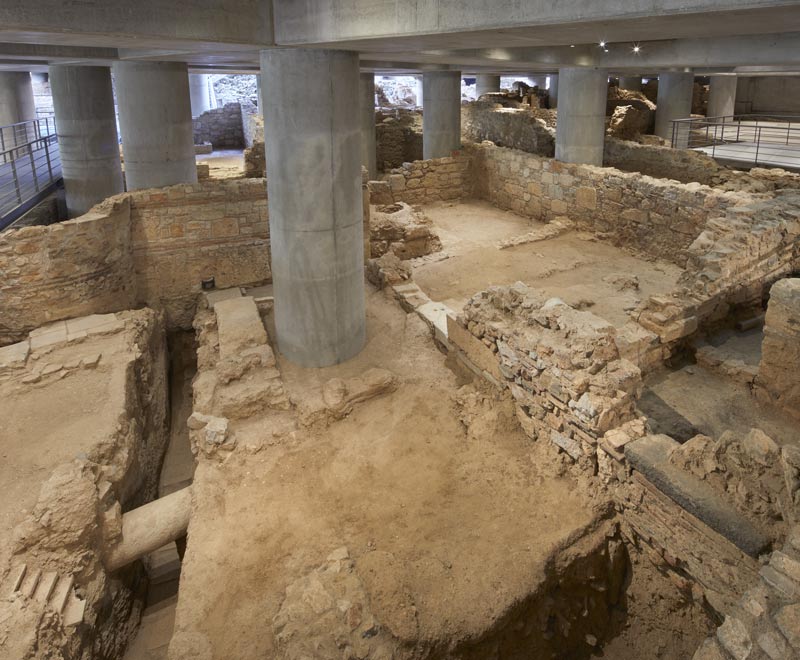

 The remains of the neighborhood on top of which the Acropolis Museum was built. Credit: Acropolis Museum
The remains of the neighborhood on top of which the Acropolis Museum was built. Credit: Acropolis Museum
More than 1,100 artifacts from an ancient Athens neighborhood, discovered during excavations in the area of its modern Acropolis museum, are now showcased in a permanent exhibition.
Artifacts unearthed from the foothill of the Acropolis Hill that hosts the Parthenon temple, have been restored and are part of a site Greece calls “the museum under the museum” that opened recently.
Exhibits include statues, children’s table games, and everyday items from storage vessels and cooking pots to weaving tools and needles.
They are a testament to residents’ daily life over 4,500 years, the culture ministry said.
 The exhibition includes everyday items, from storage vessels and cooking pots to weaving tools and needles. Credit: Acropolis Museum
The exhibition includes everyday items, from storage vessels and cooking pots to weaving tools and needles. Credit: Acropolis Museum
Ancient Athens neighborhood museum is like a giant exhibit
The remains of the neighborhood on top of which the Acropolis Museum was built reconstruct a complex of streets, homes with spacious rooms and courtyards, and baths and workshops, and have been accessible to visitors since 2019.
Visitors are allowed to wander through the archaeological excavation which stretches underneath the museum like a giant exhibit.
 The ancient Athenian neighborhood. Credit: AMNA
The ancient Athenian neighborhood. Credit: AMNA
They can walk on the ancient neighborhood’s streets, take a closer look at the houses with their courtyards and wells, enter the heart of the impressive mansions with the private baths, and examine the workshops with the water reservoirs. They can also take a magical stroll through time and the daily life of the people who lived in the shadow of the Acropolis’ rock for over 4,500 years.
The Athenian neighborhood was occupied from the 5th century BC to the 12th century AD.
From the 4th millennium BC to the end of the Archaic era, the area was inhabited but not very populous.
After 480 BC, when the city of Athens expanded, the site was incorporated in the ancient city and started to develop rapidly.
“Placed on the southern fringes of the archaeological site, (the exhibition) fits harmoniously into the visitor’s journey, contributing to the understanding of people’s everyday life,” said Culture Minister Lina Mendoni.
 The museum under the museum. Credit: Acropolis Museum
The museum under the museum. Credit: Acropolis Museum
Acropolis Museum seeks to host the Parthenon in its entirety
More than 1.5 million people annually visit the 14,000 square meter (16,743.86 square yards) Acropolis Museum, which is meant to visually connect with the Parthenon and other temples on the Acropolis Hill.
About half of the 160-meter frieze from the Parthenon temple is in the British Museum, while 50 meters of the carvings are in the museum in Athens.
Greece has repeatedly urged the British Museum to permanently return the 2,500-year-old sculptures that British Diplomat Lord Elgin removed from the temple in 1806, during a period when Greece was under Ottoman Turkish rule.
Mendoni said the new museum was the ideal venue to host the Parthenon frieze in its entirety. “This museum constitutes the optimal physical and conceptual framework for highlighting, interpreting and understanding its masterpieces,” she said.
